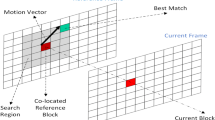Abstract
In this paper, the energy-scalable motion estimation is proposed for low-power mobile multimedia applications, where the quality of encoded image sequences is scalable with power consumption. In the multimedia applications, there are usually several alternative algorithms with different performance and power. Considering the trade-off between performance and power, the proposed algorithm adaptively determines the optimal alternative to achieve optimal performance under a given power constraint. Compared with the conventional algorithms, the proposed algorithm reduces the power reduction to 1/31.0 1/11.0 without performance degradation.
Access this chapter
Tax calculation will be finalised at checkout
Purchases are for personal use only
Preview
Unable to display preview. Download preview PDF.
Similar content being viewed by others
References
Rabaey, J.: Low-Power Silicon Architectures for Wireless Communication, Asia and South Pacific Design Automation Conference, pp. 379–380 (2000)
Chandrakasan, A., Brodersen, R.: Low Power Digital CMOS Design. Kluwer Academic Publishers, Dordrecht (1995)
Sakurai, T., Newton, A.: Alpha-Power Law MOSFET Model and Its Application to CMOS Inverter Delay and Other Formulas. IEEE Journal of Solid State Circuits 25, 584–594 (1990)
Chandrakasan, A., Sheng, S., Brodersen, R.: Low-Power CMOS Digital Design. IEEE Journal of Solid State Circuits 27, 473–484 (1992)
Ishihara, T., Yasuura, H.: Voltage Scheduling Problem for Dynamically Variable Voltage Processors. In: IEEE International Symposium on Low Power Electronics and Design, pp. 197–202 (1998)
Yao, F., Demers, A., Shenker, S.: A Scheduling Model for Reduced CPU Energy. In: IEEE Annual Foundations of Computer Science, pp. 374–382 (1995)
Hong, I., Kirovski, D., Qu, G., Potkonjak, M., Srivastava, M.: Power Optimization of Variable-Voltage Core-Based Systems. IEEE Transactions on Computer-Aided Design of Integrated Circuits and Systems 18, 1702–1714 (1999)
Shin, Y., Choi, K.: Power Conscious Fixed Priority Scheduling for Hard Real-Time Systems. In: Design Automation Conference, pp. 134–139 (1999)
Lee, S., Sakurai, T.: Run-Time Voltage Hopping for Low-Power Real-Time Systems. In: Design Automation Conference, pp. 806–809 (2000)
ISO/IEC JTC1/SC29/WG11 14496-2: Coding of Audiovisual Object: Visual (1998)
Koga, T., Ilnuma, K., Hirano, K., Iijima, Y., Ishiguro, T.: Motion Compensated Interframe Coding for Video conferencing. In: National Telecommunication Conference, G.5.3.1- 5.3.5 (1981)
Jong, H., Chen, L., Chiueh, T.: Accuracy Improvement and Cost Reduction of 3-Step Search Block Matching Algorithm for Video Coding. IEEE Transactions on Circuits and Systems for Video Technology 4, 88–90 (1994)
Liu, C., Layland, J.: Scheduling Algorithms for Multiprogramming in a Hard Real-Time Environment. Journal of ACM 20, 46–61 (1973)
Lim, S., Bae, Y., Jang, G., Rhee, B., Min, S., Park, C., Shin, H., Park, K., Kim, C.: An Accurate Worst Case Timing Analysis for RISC Processors. In: Real-Time Systems Symposium, pp. 97–108 (1994)
Author information
Authors and Affiliations
Editor information
Editors and Affiliations
Rights and permissions
Copyright information
© 2003 Springer-Verlag Berlin Heidelberg
About this paper
Cite this paper
Lee, S. (2003). Energy-Scalable Motion Estimation for Low-Power Multimedia Applications. In: Ventre, G., Canonico, R. (eds) Interactive Multimedia on Next Generation Networks. MIPS 2003. Lecture Notes in Computer Science, vol 2899. Springer, Berlin, Heidelberg. https://doi.org/10.1007/978-3-540-40012-7_33
Download citation
DOI: https://doi.org/10.1007/978-3-540-40012-7_33
Publisher Name: Springer, Berlin, Heidelberg
Print ISBN: 978-3-540-20534-0
Online ISBN: 978-3-540-40012-7
eBook Packages: Springer Book Archive




